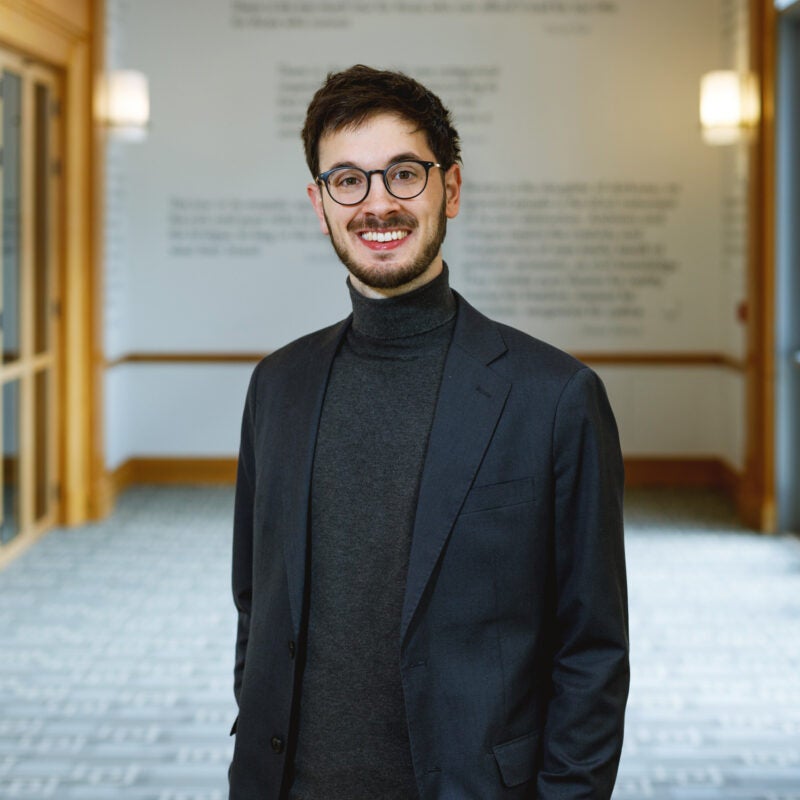This is one in a series of profiles of 2023 Cravath International Fellows.
As a 2023 Cravath International Fellow, Francisco Balbín LL.M. ’23 conducted an independent clinical with the United Nations Office of the High Commissioner for Human Rights in Geneva, Switzerland. Prior to coming to Harvard Law School, Balbín, a lawyer from Argentina, worked in the Secretariat of International Human Rights Law in the Public Defender’s Office and as a consultant for the Inter-American Commission on Human Rights, an organ of the Organization of American States, where he focused on cases relating to forced disappearances in Venezuela and torture in Colombia. His winter term placement was, in part, an opportunity to gain practical experience with a UN treaty body.
He spoke this fall with Wasserstein Fellow-in-Residence María Cecilia Ercole, a human rights officer with the High Commissioner’s office, who connected him with a team that manages a fund to support grassroots organizations and other initiatives assisting victims of torture. Balbín’s role was to research newer standards on the definition of torture, to help the team update its guidelines for applicants and grantees. Expanding the definition of torture in the guidelines would allow more organizations to benefit from the fund.
This definition, he explains, begins with Article 1 of the Convention Against Torture and Other Cruel, Inhuman or Degrading Treatment or Punishment, which was enacted in 1984. The definition given by the convention has four elements: the nature and severity of the act or omission; the act or omission must be intentional; it has to have a purpose, such as obtaining information or a confession, punishing or discriminating against a person; and it requires the participation of public officials. In conducting his research, Balbín also looked at standards from other regional courts, the International Court of Justice, the International Criminal Court, and UN treaty bodies.
It is the fourth component where “there has been more jurisprudential development, because now it is more broadly understood that it is not necessary to demonstrate the direct participation of public officials. You can also demonstrate that there has been an act or omission that has occurred with their consent or acquiescence,” he explains. In the same vein, the Committee Against Torture, the Inter-American Court of Human Rights, and the European Court of Human Rights have expanded their concept of torture to include acts of torture committed by private actors when the state knew or should have known that these acts had been committed.
Looking back, Balbín says that he learned a great deal during his winter term project. At the Inter-American Commission, “my job was to work on draft opinions on cases, so I always worked with facts, and with arguments from one side or the other, but this was totally different. When you don’t have a file to look at, you have more sources, and more freedom to explore.” He was able to draw on what he learned in his fall course on Human Rights and International Law with Professor Gerald Neuman to identify sources, and “as my advisor for this project, he also prepared me with challenging questions about the concept of torture and the mandate of the fund that I could discuss with my supervisor.”
He also appreciated the exposure he had to the way in which the team operated, including “how they meet weekly to organize projects [and] analyze what they had already done in order to make the process better.” The team includes lawyers and other specialists, such as linguists and psychologists, “so it was also very interesting to discuss legal concepts or the definition of torture with them and see how other disciplines can contribute.” For example, there are practices, such as female genital mutilation and the death penalty that they think should be included in the definition, although there some states that disagree.
After graduation, Balbín will return to the Public Defender’s Office, but he doesn’t rule out pursuing a new opportunity in the inter-American system. Because of the region’s history of military dictatorships, he notes, the Inter-American Court of Human Rights has developed significant jurisprudence on forced disappearance and torture.
Want to stay up to date with Harvard Law Today? Sign up for our weekly newsletter.
